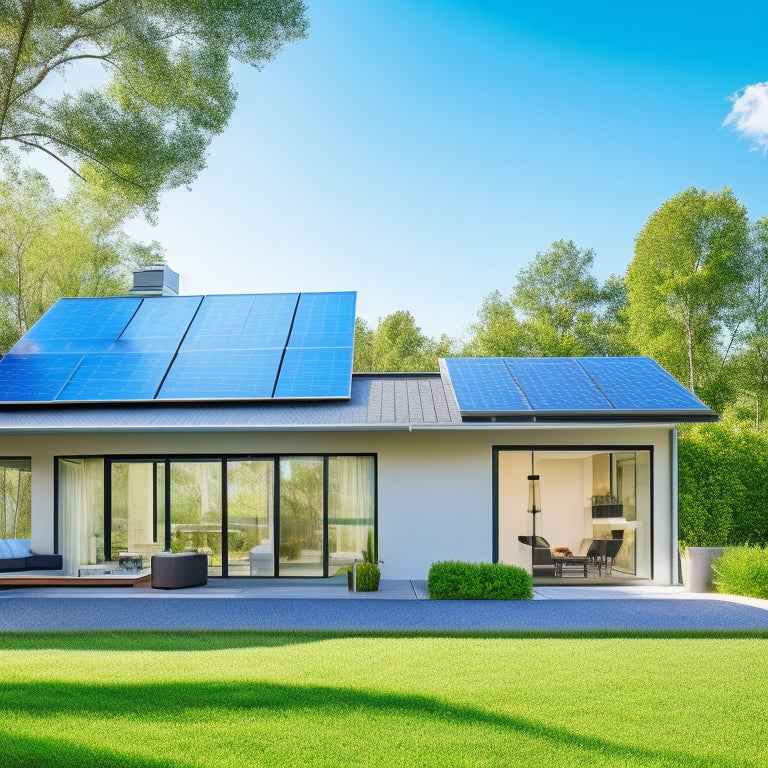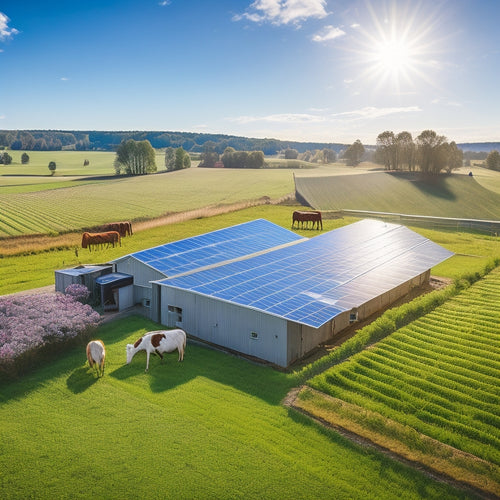
Optimize Your Home's Energy Efficiency With Smart Panels
Share
By incorporating smart panels into your home's solar energy system, you can greatly increase energy production and reduce consumption, with advanced features like real-time monitoring and shading detection allowing you to optimize energy output and minimize losses. Smart panels employ advanced technology to enhance energy production, and their performance tracking provides detailed analytics on energy production. To maximize efficiency, you'll want to take into account factors like temperature, angle, and orientation, as well as inverters that efficiently convert DC power to usable AC power. Now, learn how to fine-tune your system to unveil its full potential.
Overview
- Smart panels with advanced technology enhance energy production and real-time monitoring for optimal energy output.
- High-efficiency solar panels, like those from Renogy, lead to increased energy production and savings.
- Regular cleaning and optimal angle/orientation increase energy output, while shading analysis and mitigation strategies minimize losses.
- Inverters with high CEC ratings, such as microinverters, efficiently convert DC to AC power for maximum energy production.
- Real-time performance tracking and adaptation to environmental changes ensure peak efficiency and energy savings.
Understanding Solar Panel Efficiency
Most households weighing the option of solar panels as a means to reduce their carbon footprint and energy bills want to know how efficient these systems are.
You're investing in solar technology to reap energy savings, after all. The efficiency of solar panels is measured by their ability to convert sunlight into electrical energy. Typically, commercial solar panels have an efficiency rating between 15% to 20%. This means that for every unit of sunlight that hits the panel, it can produce 15% to 20% of that energy as electricity.
When selecting a solar panel system, it's crucial to evaluate top brands that offer high-efficiency rates, such as Renogy, to maximize energy production. While higher efficiency ratings are available, they often come at a higher cost.
With advancements in solar technology, you can expect improved energy savings and a reduced carbon footprint. By understanding solar panel efficiency, you're one step closer to optimizing your home's energy efficiency.
How Smart Panels Boost Efficiency
As you weigh the benefits of traditional solar panels, you may be wondering if there's a way to further enhance their energy production. That's where smart panels come in, equipped with advanced smart technology to maximize energy savings. These panels can identify and adjust to changes in temperature, shading, and other environmental factors to guarantee peak performance.
| Feature | Traditional Panels | Smart Panels |
|---|---|---|
| Energy Monitoring | No real-time monitoring | Real-time monitoring and optimization |
| Shading Mitigation | Limited shading tolerance | Advanced shading detection and compensation |
| Performance Tracking | Limited performance data | Detailed performance data and analytics |
Measuring Efficiency With Ratings
You're likely aware that solar panels are rated for their efficiency, but do you know how these ratings are determined or what they really mean?
Efficiency metrics like the "peak sun hours" rating measure how well a panel converts sunlight into usable energy. A higher rating indicates a panel can generate more power per hour of sunlight.
Another key metric is the "efficiency percentage," which represents the percentage of sunlight converted into electricity. A higher percentage means less energy is wasted as heat.
Regular cleaning clean panels can also improve energy output by up to 25%, making it an essential part of maintaining ideal panel performance.
When selecting smart panels, look for high efficiency ratings to minimize energy consumption and maximize your return on investment.
Impact of Temperature on Performance
Every 1°C increase in temperature above 25°C can reduce solar panel efficiency by up to 0.45%. This means temperature extremes, seasonal variations, and climate zones all impact your smart panel's performance.
In hot and humid climates, humidity effects can further decrease efficiency. High humidity and salt mist exposure necessitates corrosion-resistant designs, which is essential for coastal installations.
Even high-altitude installations face challenges from thinner air and intense UV radiation, which can reduce efficiency and thermal management.
Even nighttime performance is affected, as high temperatures can linger into the night. Geographic influences, such as desert or tropical locations, also play a role.
Installation conditions, like shading or tilt, can mitigate or exacerbate these effects. Understanding these factors is vital to optimizing your smart panel's operational limits.
Angle and Orientation Matter
Frequently, solar panels are installed at a fixed angle, which can considerably impact their energy output.
You should consider the most effective angle and orientation for your panels to maximize energy production. Panel placement is critical, as it affects sun exposure. Ideally, you want your panels to face directly at the sun, but this isn't always possible. Adjusting the angle and orientation can help you capture more sunlight throughout the day.
In the northern hemisphere, a south-facing orientation is usually best, while in the southern hemisphere, a north-facing orientation is ideal.
Shading Effects on Energy Output
When evaluating your solar panel system's performance, it is vital to reflect on the impact of shading on energy output. Shading can considerably reduce the amount of energy your system produces, making it essential to conduct a shading analysis to identify potential obstacles. This analysis will help you determine the best shading mitigation strategies for your specific system.
| Shading Source | Mitigation Strategy |
|---|---|
| Trees | Trim or remove trees to reduce shading |
| Buildings | Install panels at an angle to minimize shading |
| Roof features | Use panel clamps to raise panels above obstacles |
| Weather conditions | Install a tracking system to adjust panel angle |
Maximizing Efficiency With Inverters
Your solar panel system's performance relies heavily on the efficiency of its inverters, which convert DC power into usable AC power for your home.
To maximize efficiency, it's crucial to choose the right inverter type for your system. There are three main inverter types: string inverters, microinverters, and power optimizers. Each has its strengths and weaknesses.
String inverters are the most common, but microinverters offer more flexibility and monitoring capabilities. Power optimizers provide a balance between the two.
When comparing efficiency, look for the California Energy Commission (CEC) rating, which measures an inverter's efficiency under various operating conditions. A higher CEC rating indicates better performance.
Frequently Asked Questions
Can I Install Smart Panels on an Existing Solar Panel System?
You can upgrade your existing solar panel system with smart panels, but first, verify compatibility by checking your existing system's voltage, current, and connectivity requirements, then follow the smart panel installation guidelines for a seamless integration.
Do Smart Panels Work With All Types of Roofs and Materials?
You'll find that smart panels can accommodate various roof types, but it's vital to follow specific installation guidelines for each material, ensuring a secure and efficient fit, regardless of whether you have asphalt shingles, metal, or clay tiles.
How Do I Know if My Home Is Suitable for Smart Panels?
You're trapped in a cycle of high energy consumption, but freedom from hefty bills awaits. Assess your home's suitability for smart panels by evaluating installation costs, roof size, and energy usage patterns to determine if this game-changing tech is right for you.
Are Smart Panels Compatible With Energy Storage Systems?
You're wondering if smart panels work with energy storage systems? Yes, they're compatible, enabling advanced energy management and maximizing cost savings by optimizing energy usage, storing excess power, and reducing reliance on the grid.
Do Smart Panels Require Special Maintenance or Cleaning?
Like a well-oiled machine, your smart panels hum along, but don't presume they're maintenance-free; you'll need to dust them regularly and perform routine inspections to guarantee peak performance and longevity, giving you the freedom to reap their energy-saving benefits.
Ready to Buy
You've optimized your home's energy efficiency with smart panels, but you might be thinking, "What about the upfront cost?" While it's true that smart panels are a bigger investment, they'll pay for themselves in the long run. With improved efficiency, you'll generate more power and save more money on your energy bills. Plus, many governments offer incentives for switching to renewable energy sources. So, go ahead and make the smart choice – your wallet and the environment will thank you.
Related Posts
-

What Do I Need to Know About Farm Solar Panels
When considering farm solar panels, you need to assess costs, benefits, and technical specifics. Initial investment c...
-

Why Outdoor Solar Lighting Systems Are Sustainable
Outdoor solar lighting systems are sustainable because they utilize renewable energy, drastically reducing your carbo...
-

Key Components of a Reliable Emergency Power Supply System
A reliable emergency power supply system requires several key components. You need proven performance metrics to guar...


